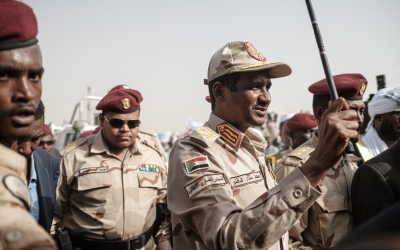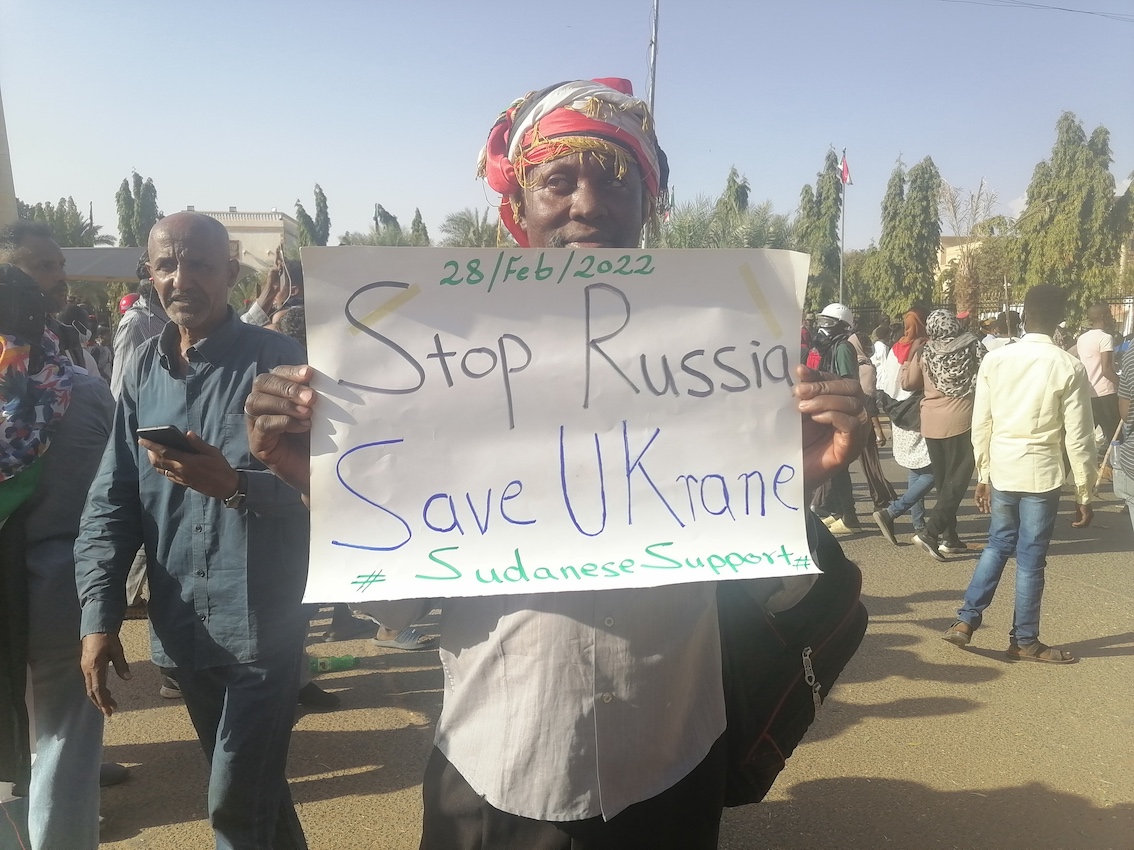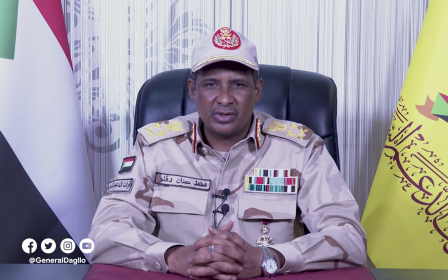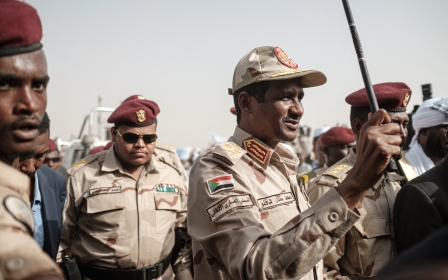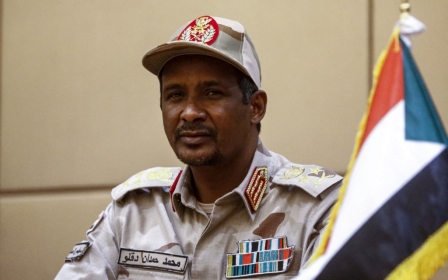Sudan: Hemeti's Russian visit sends defiant message to US and EU
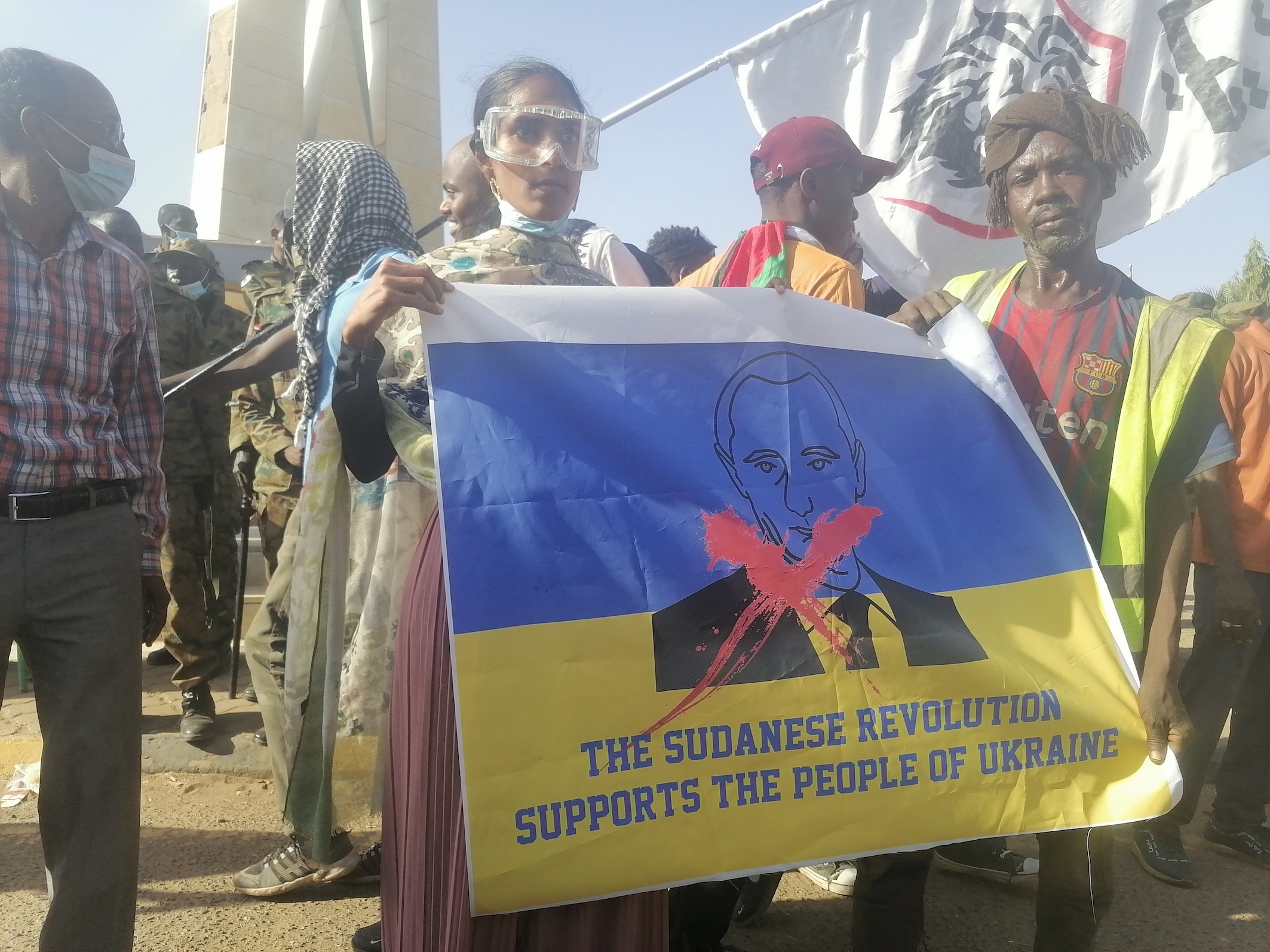
The recent week-long visit of Sudanese military leader and Sovereign Council deputy chairman General Mohamed Hamdan Dagalo to Russia, which began before the invasion of Ukraine and concluded on 2 March, has caused controversy at home.
Some hail Dagalo, widely known as Hemeti, for standing defiant in the face of prevailing winds, while others are criticising him for driving Sudan back into international irrelevance.
'The junta is hijacking the country and wants to stay in power by any and all means, including standing with Putin'
- Walid Ali, Sudanese Professionals' Association
Opposition groups believe Hemeti, head of the Rapid Support Forces (RSF) militia, is pushing Sudan back into a state of isolation, with the growing threat of further international sanctions following the 25 October military coup of last year.
While that coup was led by Sudan’s current de facto head of state General Abdel Fattah al-Burhan, Hemeti, who initially kept a low profile, is a key part of it.
The militia leader’s visit to Moscow has recalled memories of ousted president Omar al-Bashir’s trip to Russia in November 2017, when Bashir asked Russian President Vladimir Putin to protect Sudan from US intervention.
Hemeti arrived in Russia on 23 February, a day before Russia invaded Ukraine.
“As for Russia, it has the right to act in the interests of its citizens and protect its people. This is her right under the constitution and the law,” the RSF leader said at the time. “The whole world must realise that it is their right to defend their people.”
The visit was an unusually long one, and Hemeti's position on Russia and Ukraine was adjusted after the invasion, when he said a diplomatic solution would be preferable.
Accompanied on the trip by Sudan’s finance, energy, agriculture and mining ministers, as well as the head of the Sudanese chambers of commerce, Hemeti met with Russian Foreign Minister Sergey Lavrov and Alexander Fomin, Moscow’s deputy defence minister.
Former Sovereign Council member Siddig Tawir told Radio Dabanga that Hemeti’s visit was “an adventure”, and explained that it was prompted by “the isolation that Sudan is experiencing after the 25 October coup”.
Rogue state
Sudanese Professionals' Association (SPA) spokesperson Walid Ali said that Hemeti’s trip to Russia would instead lead to the isolation of Sudan, adding that it was harmful for Sudanese revolutionaries, who are supporting the Ukrainian people. Ever since the invasion, protesters on the streets of Sudan have raised flags and banners in solidarity with Ukrainians.
“The junta is hijacking the country as a whole and wants to stay in power by any and all means, including standing with Putin or supporting the attack against Ukraine,” Ali told Middle East Eye.
“This includes the selling off of Sudanese resources to Russia and others that support the military coup. This situation will push us back to square one, with Sudan isolated and excluded from the international community,” he said.
“We have nothing to do with the West or with the East, but we as Sudanese revolutionaries strongly support the people of Ukraine. Our revolution’s main slogan calls for peace for our people and for the nations of the world,” Sara Ahmed, a resistance committee member, told MEE during a protest in front of the Sudanese presidential palace on Thursday.
Former US diplomat and CIA analyst Cameron Hudson told MEE that the United States administration was concerned to see Hemeti endorse and associate Sudan with Russia’s unprovoked attack on Ukraine.
“When PM [Abdalla] Hamdok said in 2019 that Sudan wanted to rejoin the international community after years of sanctions and isolation, we believed he was speaking not just for himself but for the whole of Sudan,” Hudson told MEE.
“Hemeti’s visit was a big step back from that and the most recent demonstrations of the junta’s willingness to subvert the will of the Sudanese people to hold on to power,” he said.
The Sudanese administration argued that this was a misrepresentation of its position. Foreign ministry official Nadir Youssef said that Sudan supported a negotiated solution to the Ukraine crisis, but would continue to pursue its own interests.
“Sudan is supporting a diplomatic and peaceful solution for the Ukrainian crisis, but Sudan has its interests and wants to achieve them based on the options available, in order to serve the ambitions of its people,” Youssef told MEE.
A Russian Red Sea naval base
Hemeti, who has been accused of committing war crimes in Darfur when he was leader of the Janjaweed militia, said Sudan had no problem with Russia opening a naval base on its Red Sea coast, providing it posed no threat to national security.
“We have 730km along the Red Sea. If any country wants to open a base and it is in our interests and doesn't threaten our national security we have no problem in dealing with anyone, Russian or otherwise,” he said.
'Hemeti’s trip to Moscow as the invasion of Ukraine was underway sent a clear message to the US and the EU'
- Patrick Smith, Africa Confidential
Military leaders say an agreement reached by Bashir to host a Russian naval base remains under review. Echoing Bashir, Hemeti alluded to the existence of US and French military bases across Africa when he asked why “people are talking about military bases in Sudan, while there are military bases everywhere in Africa, like in Djibouti and Niger…”
For Patrick Smith, editor of Africa Confidential, “Hemeti’s trip to Moscow as the invasion of Ukraine was underway sent a clear message to the US and the EU, as did his statement that he was open to Russia opening a naval base on Sudan’s Red Sea coast.”
Smith said, though, that it was “not clear that all the senior officers in the Sudan Armed Forces agree with those tactics, which scupper any chance that western states would resume aid to Khartoum before the junta leaves power.”
Hudson, who previously served as the US special envoy to Sudan’s chief of staff, said that the establishment of a Russian military base in Sudan would be seen as a threat to US national security interests in the region.
“The US has sought through diplomatic and military contacts to dissuade Sudan’s civilian and military from finalising that deal as it would signal a shift away from Sudan’s previous desire to renew relations with the West,” Hudson said.
“More importantly, it would give Russia a much needed strategic foothold and warm water base on the Red Sea from which it could advance other strategic objectives across Africa and the Middle East.”
Illicit gold claims
Russia has reportedly smuggled hundreds of tonnes of illicit gold from Sudan over the last few years as a way to combat international sanctions, though a source close to the RSF denied the claims.
Hudson, a senior fellow at the Atlantic Council, says the reports are correct, adding that Hemeti and his RSF have strong ties to the Russian mercenary Wagner Group.
“There are extensive rumours that Hemeti took with him in excess of $30m in Sudanese gold to Russia and has signed new gold mining deals with Russian interests,” Hudson told MEE.
“This is on top of an existing relationship in the mining and security sectors, between the Wagner Group and the Dagalo family. As both Sudan and Russia are newly isolated on the world stage, it’s unsurprising and deeply disturbing that they would choose to deepen their business and security ties,” he added.
Reacting to the allegations, the RSF source, who asked for anonymity because he is not authorised to talk to the media, described Hudson’s claims as “propaganda”.
“We used to hear such propaganda from the western diplomats. We made it clear that Sudan is seeking all transparent ways of doing business. We have nothing to hide and we have the right to build relations with whoever we want,” the source said.
A roll of the dice
Sudanese political analyst Mohamed Badawi compared Hemeti’s visit to desperate trips taken by Bashir to Saudi Arabia and Russia in 2017, when the Islamist autocrat returned with no political or economic benefits.
Badawi, who is a senior analyst at the African Centre for Justice and Peace Studies (ACJPS), told MEE the cons of the visit outweighed the pros, with attention now drawn to the RSF’s gold and mercenary-related activities.
“The Russians want gold from Africa. That includes Sudan, Central African Republic, Mali and others. But this depends on buying refined gold without being directly involved in the conflicts in these countries,” Badawi said.
“Also, if the Russians want to deepen their security and economic ties with Sudan they will choose to do so with the regular military, not the RSF, especially as they are now under huge pressure and heavy sanctions.”
As Smith said, there are disagreements across the military about how Sudan should be navigating international affairs. Some saw Hemeti’s visit as a sign that he is being isolated by Burhan, who is the leader of the Sudanese Armed Forces as well as the de facto head of state.
'The Russians want gold from Africa. That includes Sudan, Central African Republic, Mali and others'
- Mohamed Badawi, political analyst
Burhan’s army and Hemeti’s RSF represent the two main branches of Sudan’s military, but that does not mean they always share the same methods and aims.
Mohamed Aljak, an economics professor at Khartoum University, said that Sudan would suffer from positioning itself alongside Russia, despite any financial support it might get from Moscow.
“It looks as though Hemeti and his delegation were trying to get promises of financial support and [a] flow of investments in mining, energy, agriculture and other sectors, but in the end that wouldn’t cover the benefits that Sudan was about to get from the US, EU as well as international organisations like the International Monetary Fund (IMF) and the World Bank,” Aljak told MEE.
“This step may also lead to painful sanctions on Sudanese gold in the international and regional gold stock market and in this case Russia and others won’t be able to help,” he said.
The US, EU, IMF and World Bank have suspended billions of dollars of financial support to Sudan because of the military coup.
The process of dropping $14bn of Sudan’s $56bn foreign debts has also been suspended by Paris Club donors since last October.
Middle East Eye propose une couverture et une analyse indépendantes et incomparables du Moyen-Orient, de l’Afrique du Nord et d’autres régions du monde. Pour en savoir plus sur la reprise de ce contenu et les frais qui s’appliquent, veuillez remplir ce formulaire [en anglais]. Pour en savoir plus sur MEE, cliquez ici [en anglais].


